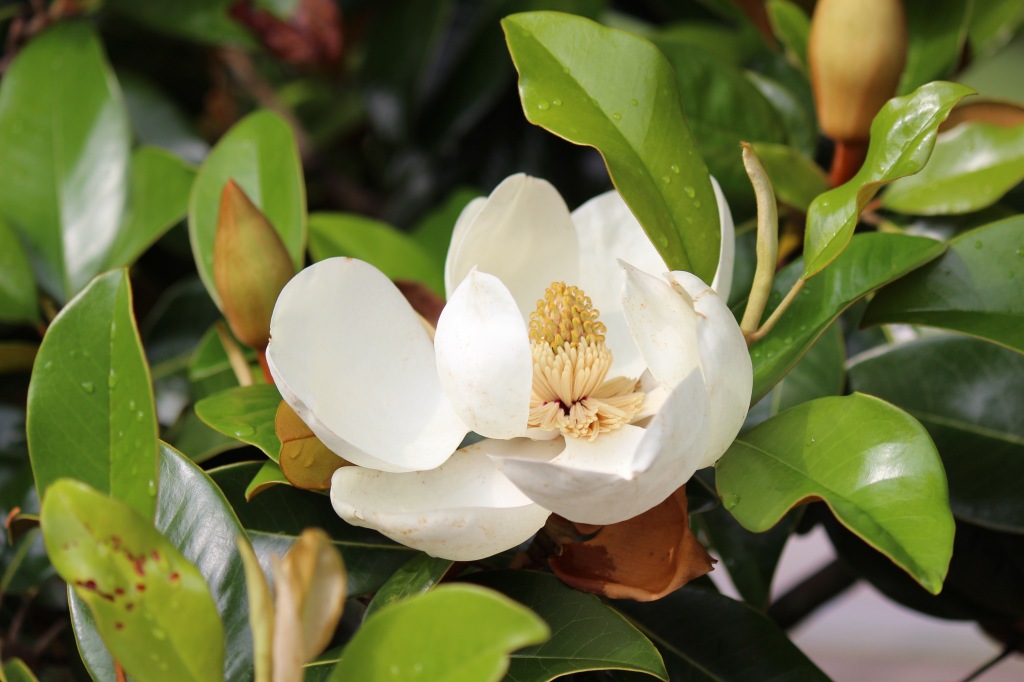The Privileged Life: Magnolias
“And the earth brought forth grass, the herb that yields seed according to its kind, and the tree that yields fruit, whose seed is in itself according to its kind. And God saw that it was good.” Genesis 1:12
Magnolia. The very word drips off the tongue like sorghum molasses on hot cornbread. It reeks of characters in Tennessee Williams plays, and it dredges up memories of sultry summer evenings in the Mississippi Delta where I grew up.
Southern magnolias (magnolia grandiflora) are the dowager queens of the Southern landscape. They grow stately and tall, very slowly, and their leaves are shiny green year-round. They live a long time, growing very slowly. A Southern magnolia tree, planted sometime in the mid-1800s in a California garden, is now over nine stories tall.1 One of the oldest ones is in Rome, Italy, estimated at more than 300 years old.2 Another one, planted by President Andrew Jackson on the White House lawn, lasted until just two years ago when it finally succumbed to rot from a gash it had acquired in the 1940s. Magnolias are hardy trees.
In summer, the magnolia’s saucer-like white blossoms drench the air with a sweet lemony fragrance. Its smooth, sturdy branches make great climbing spots for kids. And while it has no fruit, its seed pods make interesting additions to dried arrangements and potpourri.
Magnolia leaves make fabulous tablescape and mantle decorations at Christmas. My brother-in-law Randy once made a six-foot Christmas tree with a “teepee” of wooden stakes covered in chicken wire: he clipped leafy clusters from a friend’s magnolia tree, piled them into the wire, and festooned it all with gold ribbons and poofy bows. It was amazing, and his friend must have been a really good one to let him rob that many branches. (My husband and I have been known to rob others’ trees at Christmas, too, but don’t let on….)
In the South, we love our trees and grow quite attached to them. The second major argument of my three-decades-long marriage to Mark (our first was on the golf course…but that’s another story…) was over the old magnolia tree in our front yard in Memphis. Mark wanted it cut down. Too many of its branches had been chopped off over the years, the constantly falling leaves were messy, and it was leaning over our neighbor’s driveway. Mark was concerned that it would eventually fall on a car. I, the magnolia-lover, couldn’t bear to lose it. In the end, I had to admit it had become unsightly and agreed to hire a fellow to come take it out. We (and the tree guy) learned then that magnolias are made of rubbery concrete. Their wood is very shock resistant, and the poor fellow’s axe practically bounced off the roots as he sought to remove them from the ground. We needn’t have worried about the tree falling over. It would have outlasted us.
Today, I get to enjoy a magnificent magnolia tree every day from my kitchen window. And because it’s in our neighbor’s yard, I don’t have to clean up after it! Even now, late in the summer, it still has blooms, and I love to go stick my nose in those amazing petals to drink in the smells. I am grateful to whoever planted it originally and to my current neighbors for allowing me this privilege and indulgence.
The word tree is mentioned 298 times in the New King James version Bible. Trees in Scripture represent many things. They serve as landmarks. They bear fruit, provide shelter and nesting places for birds, and sacrifice wood for houses of worship. Because the cross of Christ was made of wood, it’s often referred to as the “tree of Calvary.” Ultimately, we will see the “tree of life” in heaven someday where it straddles the river of the water of life, and its leaves will provide healing for the nations (Revelation 22:2).
I think now of the Bible as our earthly “tree of life,” its words giving comfort, shelter, and healing away from the scorching heat of life. There is strength and majesty in its revelation of God’s glory. As with the tree I enjoy in my backyard view, I am grateful to those who planted the seed of faith in me through planting Scriptures in my heart.
If you’re privileged enough to pass a Southern magnolia tree in bloom, stop and cup its luscious white petals around your nose to be enveloped in its heady embrace. If you’re privileged to have access to a Bible, poke your nose in its pages to be embraced by the fragrant love of Jesus Christ. May you be doubly blessed!
O Lord, Creator of all things beautiful on earth, thank You for the trees around us and over us. Thank You for making them fragrant reminders of Your love. Let us hold fast to the truths in Your word and plant its seeds of faith around us. In Jesus’ name, Amen.

2https://www.monumentaltrees.com/en/ita/lazio/roma/18346_ortobotanicoromalargocristinadisvezia/
#theprivilegedlife #lightbournecreative #thankful #privileged #gratitude #abundantlife #Christianprivilege #theprayerlife #prayforUSA #prayforhealing #southernmagnolia #magnoliagrandiflora #magnolialove #ilovemagnolias #treesofthebible #deltamagnolias #becausemagnolia #magnoliachristmas #magnoliablooms
© Copyright 2020 Nancy C. Williams, Lightbourne Creative





